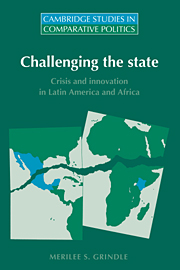Book contents
- Frontmatter
- Contents
- List of figures
- List of tables
- Acknowledgments
- 1 Challenging the state: a decade of crisis
- 2 Crisis and the state: evidence from Latin America and Africa
- 3 Crisis and breakdown in Mexico and Kenya
- 4 Imposing state authority
- 5 Managing the economy
- 6 Administering the public good
- 7 Responding to society
- 8 States of change
- Notes
- References
- Index
4 - Imposing state authority
Published online by Cambridge University Press: 27 August 2009
- Frontmatter
- Contents
- List of figures
- List of tables
- Acknowledgments
- 1 Challenging the state: a decade of crisis
- 2 Crisis and the state: evidence from Latin America and Africa
- 3 Crisis and breakdown in Mexico and Kenya
- 4 Imposing state authority
- 5 Managing the economy
- 6 Administering the public good
- 7 Responding to society
- 8 States of change
- Notes
- References
- Index
Summary
States are unique among social institutions in that they seek to ensure that their rules predominate over the rules of other institutions such as the family, the community, the tribe, or the market. In fact, the capacity to exert authoritative control has long been a defining feature of states. Characteristically, modern states must make and enforce sets of rules related to property rights, contracts, civil and criminal justice, and the selection of those who make and implement the rules. Part of their purpose is to “reduce uncertainty by establishing a stable (but not necessarily efficient) structure to human interaction.” The most authoritative states are those in which the right to make and enforce rules is based on widespread acceptance of their legitimacy to do so.
But the history of economic and political development in Latin America and Africa is a useful reminder that institutions of state dominance are not always authoritative. The 1980s and early 1990s were replete with conflict and uncertainty over whose rules would predominate and be accepted as legitimate. Informal markets, ethnic conflict, armed subversion, sectarian claims on personal loyalties, corruption, and other evidence of institutional instability recalled the notion of the soft state, initially used by Gunnar Myrdal to refer to states that lacked capacity to enforce obligations on citizens – states unable to govern. As many states failed in authoritativeness, rival sets of institutions often set the terms for economic and political interactions.
- Type
- Chapter
- Information
- Challenging the StateCrisis and Innovation in Latin America and Africa, pp. 79 - 108Publisher: Cambridge University PressPrint publication year: 1996



